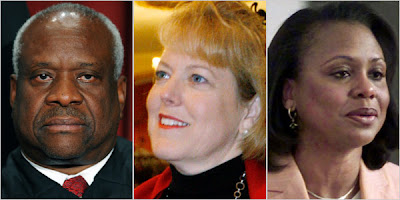anita hill photos(biography)
In 1991, Anita Hill was thrust into the public spotlight when she testified before the Senate Judiciary Committee during then Supreme Court nominee Clarence Thomas’ confirmation hearing. The legacy of her testimony includes an increased awareness of sexual harassment in the workplace today. Hill, now a law professor at Brandeis University, has continued to speak widely on social and political issues facing our world. On Thursday, April 23, at the Bennington Center for the Arts, she will reflect on a premise from President Barack Obama’s inaugural address in a lecture open to the public entitled, “Choosing America’s Better History: The Supreme Court, Civil Rights and the Promise of Citizenship.”
Anita Hill’s visit to Vermont is part of the annual Four Colleges Issues Forum, sponsored by Bennington College, Massachusetts College of Liberal Arts, Southern Vermont College and Williams College. Prior to the upcoming lecture, the four colleges will hold related learning events, including a gathering of students and faculty to discuss Hill’s 1995 biography, “Speaking Truth to Power.” The April 23 lecture, which begins at 7:30 pm in the BCA auditorium, is free and open to the public, with a brief reception following. Seating for this event is limited and tickets are required, which will be available at BCA’s box office by calling 802-442-7158.
Hill has taught law and social policy for 25 years and has lectured in the US and abroad. She has also written commentary for Time, Newsweek, The New York Times, The Boston Globe and Ms. Magazine and appears regularly on programs including Good Morning America, Meet the Press, The Today Show and Larry King Live.
Inspired by President Obama’s inaugural speech in which he asked every American “to choose our better history,” Hill’s talk will explore the role of the Supreme Court and other federal courts in enforcing civil rights and passing on the promise of meaningful citizenship from generation to generation. Her talk will address how this administration can choose members of the federal courts, including a Supreme Court Justice, in ways that promote equality and diversity.
skip to main |
skip to sidebar
Search
menu
-
▼
2011
(259)
-
▼
November
(57)
- Diego Armando Maradona girlfriends latest pictures
- Rafael Nadal latest and beautiful pictures collect...
- Martin Kaymer,Martin Kaymer pics,.Martin Kaymer wa...
- David De Gea beautiful latest pictures,wallpapers
- emran hashmi beautiful pictures,wallpapers
- deepika padukone sexy pictures latest collection
- bipasha basu sexy pictures collection
- latest,new,Beautiful 3D wallpapers-all images wall...
- historical places of india photos
- latest and beautiful Jesus Tattoos pictures
- Bruce Willis beautiful pictures
- brody jenner avril pics
- American television personality and fashion model ...
- EMO Girls wallpapers-EMO Girls pictures
- WWE World Championship The Big Show pics-The Big S...
- anita hill photos(biography)
- Kristen Stewart pictures(biography)
- Pianist and Guitarist Axl Rose pictures
- tiger woods pictures collection
- British actresses helen mirren hot pictures
- Anthony Kiedis Tattoo Pictures and wallpapers
- Alex Pettyfer pics-Alex Pettyfer wallpapers
- 2 pac pics
- 2 Pac tattoo pictures
- Megan Fox photos
- Latest Tattoos designs on Wrist
- Happy veterans day
- Latest and dangerous plane crashes photos
- car crashes
- latest crashes
- mallika sherawat hot photo in bikini
- Indian hot actress malaika arora khan pics and wal...
- Malaika Arora pics and wallpapers
- Best Bikini Bodies pictures collection
- Latest tamanna bhatia hot pictures
- Tamanna Bhatia pictures-Tamanna Bhatia biography
- Indian bollywood actress Anushka Shetty pics and w...
- Minissha Lamba hot in bikini pictures
- gul panag hot pics and wallpapers
- Hot bollywood actress Genelia pic and wallpapers
- israeli hot women pics
- beauty of israeli women pics and wallpapers
- beautiful Esha Deol pictures and wallpaper
- very hot pics and wallpaper collection of Deepika ...
- Deepika Padukone pics and wallpapers
- Bollywood actress Celina Jaitley pics-Celina Jaitl...
- Bipasha Basu hot in bakini pics and wallpapers
- hottest Bollywood actress ayesha takia
- Ayesha Takia pictures&wallpapers
- Anushka Sharma pictures&wallpapers
- Amrita Rao hot pictures-Amrita Rao hot wallpapers
- amisha patel hottest pictures and wallpapers
- Amisha Patel pictures and wallpapers
- priyanka chopra hot pictures and wallpapers
- priyanka chopra in saree pics
- beautiful Animals Of This World
- latest Bikes pics 2011
-
▼
November
(57)

















